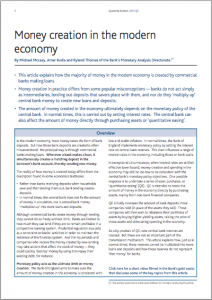Introduction
“The way monetary economics and banking is taught in many – maybe most – universities is very misleading.”
Professor David Miles, Monetary Policy Committee, Bank of England
Universities often teach ideas about money and banking that have been out of date for decades. If you’re a student in economics, banking or finance, make sure you’re understand how banks really work today, and how that affects the main social and economic challenges that we’re facing today.
1. Educate Your Professor
2014 Bank of England Paper

This Bank of England paper explains how money is created by the banking system, and highlights the ways in which the textbooks are wrong:
Money Creation in the Modern Economy
Send it to your professor and ask them to integrate it into their lectures on money creation or the money multiplier. If they’re currently using any textbook other than those by Howells & Bain, then they’re likely to be teaching an inaccurate version of how the banking system works.
Rethink Economics Open Letter
Rethink Economics is an international economics student organization with also a branch in India, the Rethink Economics India Network (REIN).
In February 2019 economics students at the University in Maastricht in the Netherlands penned an open letteb in which they challenged their economics professors and their textbooks on the money and banking theories they teach. The initial letter is now updated with the help of the organization Rethinking Economics so it can be signed by any and all economics students, professors and organizations worldwide. The problem they see is as follows.
Economics textbooks across the world, some of them first published in the 1960s, continue to teach students a model of the monetary system in which commercial banks act as intermediaries, that only move existing money around the system, like lubricant in a machine. Many economics courses rely on the models in these textbooks, without recognising the empirical evidence that undermines them. This gives an unbalanced view of the way the monetary system functions and of the role of banks in the economy.
2. Reading & Training
Get a copy of Where Does Money Come
From? – Whereas most undergraduate textbooks are based on theories about banking that are completely out of date, this book is based on original documents from the Bank of England, and was referenced in the Bank of England’s recent paper on money creation.
Bibliography
Browse the extensive Monetary Theory and Reform Bibliography on our US sister’s web site of the American Monetary Institute. Where possible it has links to original documents.

